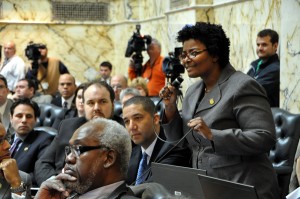Local
Md. marriage bill dead for year
Equality group remains optimistic; leaders call move a ‘strategic step’
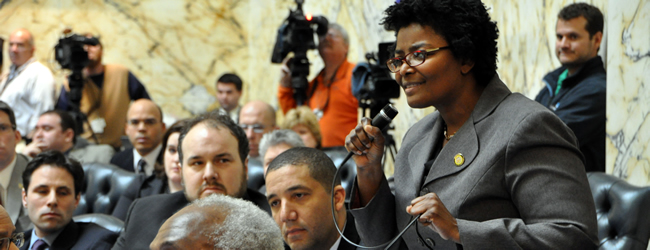
A bill to legalize same-sex marriage in Maryland died in the Maryland House of Delegates Friday after supporters determined they did not have the votes to pass it and sent it back to committee without taking a vote.
The decision to return the bill to the House Judiciary Committee, which approved it two weeks ago by a one-vote margin, came after an impassioned two-and-a-half hour debate in which six of the House’s seven openly gay members urged their colleagues to support marriage equality.
“It is best to delay this historic vote until we are absolutely sure we have the votes to win,” Equality Maryland, a statewide LGBT group, said in a statement. “While we are disappointed the House did not vote to pass marriage equality today, we are confident we will win in the future.”
House Speaker Michael Busch (D-Anne Arundel County) said in a news conference after the debate that the bill would be brought back in 2012.
Many LGBT activists watching from the visitor’s gallery did not know of plans to pull the bill if the 71 votes needed to pass it in the 141-member House could not be obtained. Some reacted with shrieks and gasps when the House approved by voice vote a motion to “recommit” the bill to committee, with nearly all of the bill’s supporters voting “aye.”
When asked how close the vote would have been, Busch told reporters that backers of the bill believed a vote would have been “very close” but decided the best course of action would be to give wavering delegates more time to mull over the issue.
“There was a chance we could have had 71,” he said. “There was an opportunity to have 70 or 69…But I think they didn’t feel comfortable that there was the full 71 vote.”
Busch was also asked why a close vote that might have resulted in the bill’s defeat this year was ruled out if everyone agreed to bring the legislation back for a vote next year.
“In my personal opinion, I think those who felt uncomfortable might have voted no and had a tough time coming back and voting yes,” he said.
According to Busch and others familiar with the House of Delegates, no more than about 10 delegates would likely be swayed to change their vote one way or the other. If a vote were held Friday and some voted no, they might be reluctant to vote for the bill next year out of fear of being accusing of being a “flip-flopper,” some of the bill’s supporters said.
Equality Maryland board member Daryl Carrington agreed with Busch’s rationale for avoiding a vote.
“We did not want to have a negative vote on the record,” said Carrington. “And we believe that it gives us the time we need. It was a strategic step to give us the additional time we need to get this done.”
Supporters lined up enough votes to defeat two amendments considered hostile to the bill, raising the possibility that backers of the bill might have enough support to pass the measure.
One of the amendments, introduced by Del. John Olszewski (D-Baltimore County), called for expanding a provision in the bill that allows religious institutions to refuse to provide goods and services and accommodations related to the “promotion of marriage” if doing so violates the institution’s religious beliefs.
The bill limits the exemptions to “religious programs, counseling, educational courses, summer camps, and retreats.” Oloszewski’s amendment would have expanded the exemption to include any program or activity operated by a religious institution, even if such products or services were offered to the general public.
The amendment was defeated by voice vote.
The second amendment, offered by Del. Cheryl Glenn (D-Baltimore City), called for eliminating the bill’s marriage provisions entirely and turning it into a civil unions bill. Her amendment also went down to defeat by a voice vote. When she asked for a roll call vote to verify the vote breakdown, Busch used his authority as speaker to refuse the roll call vote request.
Del. Emmett Burns (D-Baltimore County), an opponent of the bill, argued during the debate that the bill’s supporters were incorrectly comparing their quest for marriage equality and other LGBT rights initiatives with the black civil rights movement.
He said same-sex marriage had nothing to do with civil rights, adding that it would “validate and uphold the homosexual lifestyle,” which is contrary to his religious beliefs.
“I am a black man. I cannot change my color,” he said. “Those who are gay can disguise their propensity. They can disguise who they are.”
Del. Keiffer Mitchell (D-Baltimore City), a supporter of the marriage bill, took exception to Burns’ interpretation of the civil rights movement. Noting that he is the grandson of nationally acclaimed African-American civil rights activist Clarence Mitchell, Keiffer Mitchell said he was honored that the LGBT community and other minorities have modeled their own struggles for equality on the black civil rights movement.
Although the LGBT civil rights struggle is not the same as the black civil rights struggle, it is still falls under the category of civil rights.
“When we deny people equality under the law it is a civil rights issue,” he said.
Lesbian Delegates Heather Mizeur, Anne Kaiser, and Bonnie Cullison, each a Democrat from Montgomery County; lesbian Del. Mary Washington (D-Baltimore City); and gay Del. Luke Clippinger (D-Baltimore City) each gave impassioned floor speeches about how legalizing same-sex marriage would impact them.
While not mentioning fellow delegates opposing the bill by name, each said they were troubled and, in some cases, hurt and offended by opponents’ claims that allowing them to marry would harm children, take away religious rights, and damage the institution of marriage.
Mizeur told of her own struggle as a devout Catholic with her sexual orientation as a teenager and young adult. She said she has long since reconciled her identity as a lesbian and devoted Christian, saying she believes deeply that God accepts her for who she is.
Noting she and her partner have been married for five years, Mizeur said, “What we’re asking for is equal protection under the law…You can still choose to believe we are immoral.”
District of Columbia
Imperial Court of Washington drag group has ‘dissolved’
Board president cites declining support since pandemic
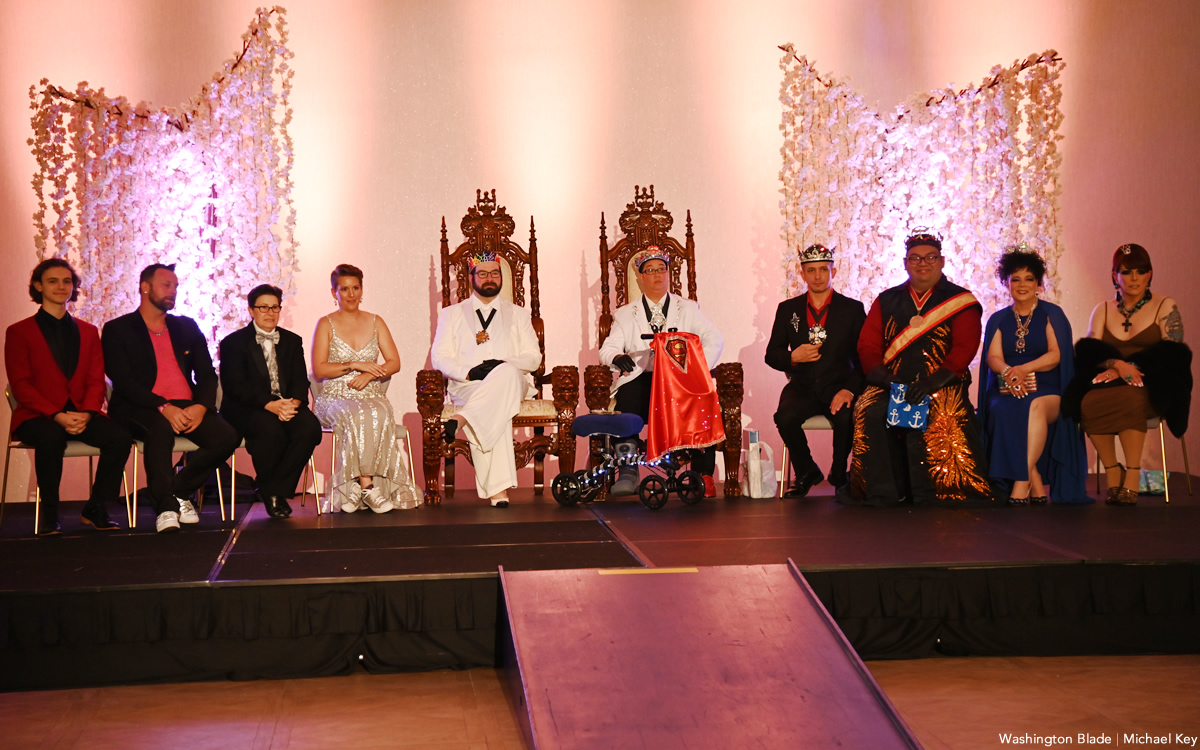
The Imperial Court of Washington, a D.C.-based organization of drag performers that has raised at least $250,000 or more for local LGBTQ and non-LGBTQ charitable groups since its founding in 2010, announced on Jan. 5 that it has ended its operations by dissolving its corporate status.
In a Jan. 5 statement posted on Facebook, Robert Amos, president of the group’s board of directors, said the board voted that day to formally dissolve the organization in accordance with its bylaws.
“This decision was made after careful consideration and was based on several factors, including ongoing challenges in adhering to the bylaws, maintaining compliance with 501(c)(3) requirements, continued lack of member interest and attendance, and a lack of community involvement and support as well,” Amos said in his statement.
He told the Washington Blade in a Jan. 6 telephone interview that the group was no longer in compliance with its bylaws, which require at least six board members, when the number of board members declined to just four. He noted that the lack of compliance with its bylaws also violated the requirements of its IRS status as a nonprofit, tax-exempt 501(c) (3) organization.
According to Amos, the inability to recruit additional board members came at a time when the organization was continuing to encounter a sharp drop in support from the community since the start of the COVID pandemic around 2020 and 2021.
Amos and longtime Imperial Court of Washington member and organizer Richard Legg, who uses the drag name Destiny B. Childs, said in the years since its founding, the group’s drag show fundraising events have often been attended by 150 or more people. They said the events have been held in LGBTQ bars, including Freddie’s Beach Bar in Arlington, as well as in other venues such as theaters and ballrooms.
Among the organizations receiving financial support from Imperial Court of Washington have been SMYAL, PFLAG, Whitman-Walker Health’s Walk to End HIV, Capital Pride Alliance, the DC LGBT Community Center, and the LGBTQ Fallen Heroes Fund. Other groups receiving support included Pets with Disabilities, the Epilepsy Foundation of Washington, and Grandma’s House.
The Imperial Court of Washington’s website, which was still online as of Jan. 6, says the D.C. group has been a proud member of the International Court System, which was founded in San Francisco in 1965 as a drag performance organization that evolved into a charitable fundraising operation with dozens of affiliated “Imperial Court” groups like the one in D.C.
Amos, who uses the drag name Veronica Blake, said he has heard that Imperial Court groups in other cities including Richmond and New York City, have experienced similar drops in support and attendance in the past year or two. He said the D.C. group’s events in the latter part of 2025 attracted 12 or fewer people, a development that has prevented it from sustaining its operations financially.
He said the membership, which helped support it financially through membership dues, has declined in recent years from close to 100 to its current membership of 21.
“There’s a lot of good we have done for the groups we supported, for the charities, and the gay community here,” Amos said. “It is just sad that we’ve had to do this, mainly because of the lack of interest and everything going on in the world and the national scene.”
Virginia
LGBTQ groups to join Spanberger inaugural parade
Virginia Pride among more than 25 orgs to march in Jan.17 event
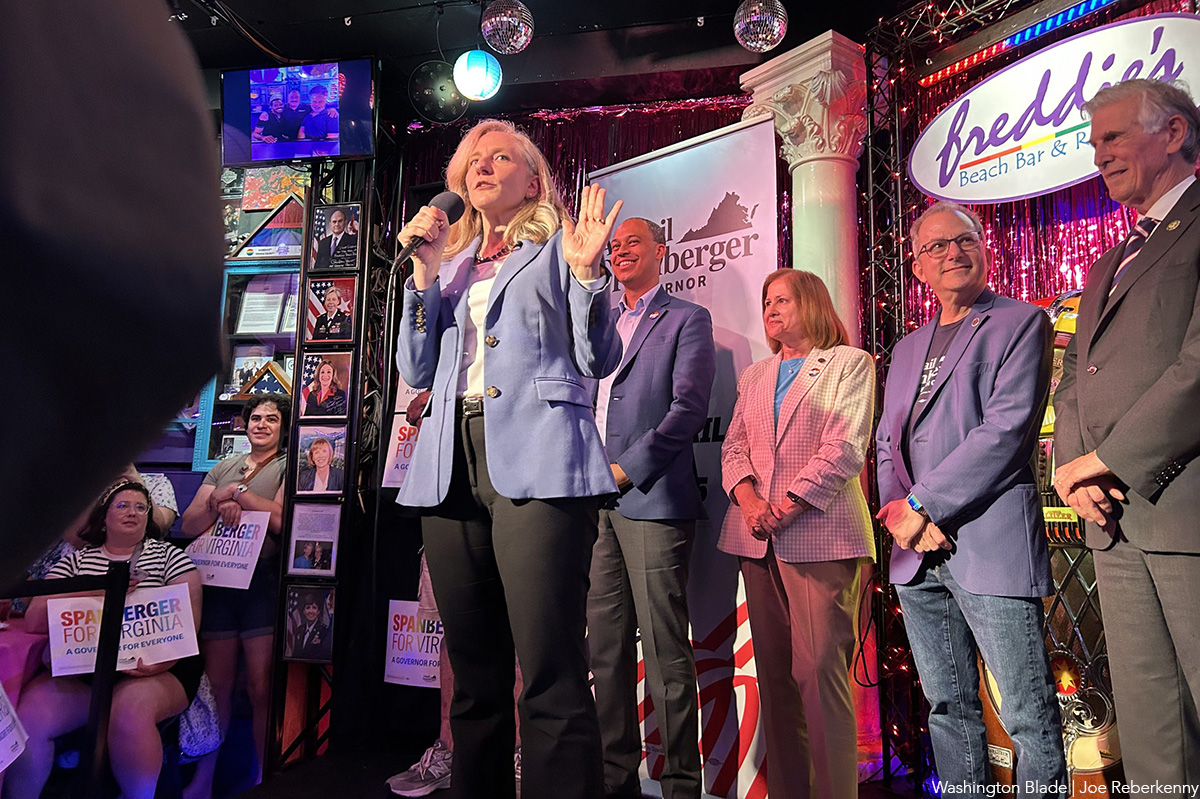
Virginia Gov.-Elect Abigail Spanberger’s inaugural committee announced on Jan. 2 that at least two LGBTQ organizations will be among more than 25 state-based organizations, including marching bands, that will participate in her inaugural parade on Jan. 17.
A statement released by the inaugural committee says the parade will take place immediately after Spanberger is sworn in as Virginia’s 75th governor and delivers her inaugural address in Richmond.
The statement lists the LGBTQ groups Virginia Pride and Diversity Richmond as two groups participating in the parade, although the two groups merged in 2021, with Virginia Pride becoming a project of Diversity Richmond. Among other things, Virginia Pride organizes Richmond’s annual LGBTQ Pride events.
“A display of the impressive talent and beauty of every corner of Virginia, our inaugural parade will be a celebration of all that makes our Commonwealth strong,” Spanberger said in the Jan. 2 statement. “I’m excited for attendees in the stands on Capitol Square and families watching together at home to see this incredible showing of Virginia pride,” she said.
James Millner, who serves as director of Virginia Pride, told the Washington Blade about 75 people are expected to join the Virginia Pride-Diversity Richmond contingent in the parade. He said among them will be members of other Virginia LGBTQ organizations.
“We’re going to invite our staff, our board, our volunteers, and our community partners to join us,” Millner said.
“We are thrilled and honored to have been invited to participate in Abigail Spanberger’s inauguration festivities,” he added. “I think this represents a marked change from the previous administration and demonstrates what she campaigned on – which is she sees the diversity of the Commonwealth as a strength that needs to be celebrated,” he said. “And we are very happy that she has invited us to represent the diversity of the commonwealth.”
Millner appeared to reflect on the sentiment of the large majority of Virginia’s LGBTQ community in its support for Democrat Spanberger over Republican Lt. Gov. Winsome Earle-Sears in the November 2025 Virginia election and the end of incumbent GOP Gov. Glenn Youngkin’s term in office on Jan. 17.
“After what we’ve been through with the Younkin administration, especially in its treatment of LGBTQ folks, especially transgender and nonconforming folks, I think we are all breathing easy and excited about what opportunities will exist in working with Abigail Spanberger,” he told the Blade.
District of Columbia
Two pioneering gay journalists to speak at Thursday event
Blade’s Chibbaro, Falls Church News-Press’s Benton talk long careers
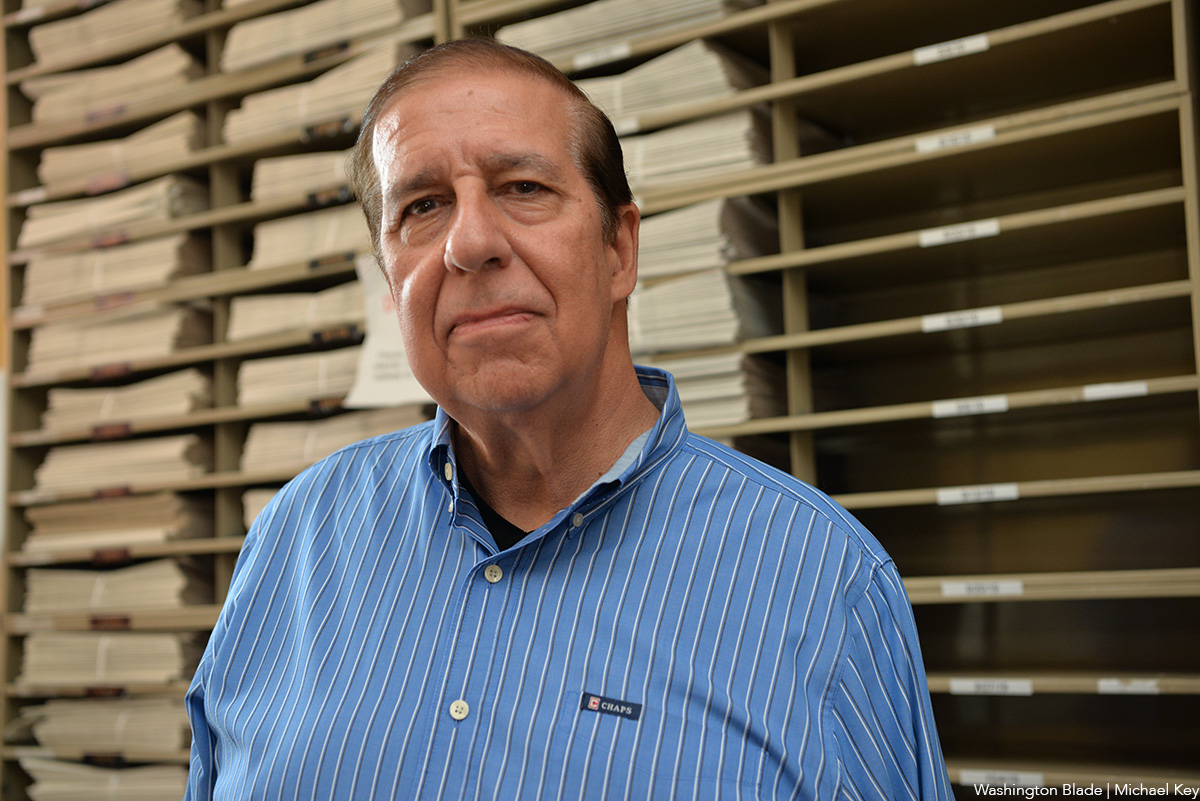
Two local gay journalists will speak on a panel this week about their long, pioneering careers.
A celebration of the Falls Church News-Press’s Nicholas Benton and the Washington Blade’s Lou Chibbaro Jr., two trailblazing LGBTQ journalists who have spent decades reporting on the front lines of social, cultural, legal, and political change in America, will be held this Thursday, Jan. 8, at the Women’s National Democratic Club of Washington. D.C., 1526 New Hampshire Avenue, N.W., at 6 p.m., according to a statement from organizers.
The program will explore their journeys, the evolution of LGBTQ journalism, and the ongoing fight for equality and justice. Benton and Chibbaro will also examine the various factors causing many news outlets to cease print publication and their energetic efforts to continue publishing their work both in print and online.
EVENT DETAILS:
- Remarks and Q&A, in-person and via Zoom.
- 6 p.m. complimentary hors d’oeuvres and cash bar; 6:30–7:30 p.m. program followed by book signing.
- Zoom only: $10. In-person: members: $20, nonmembers: $30 plus tax.
Benton’s latest book, “Please Don’t Eat Your Children, Cult Century, and Other Essays,” will be available for purchase at the event.
Benton is a longtime local journalist and LGBTQ rights activist whose work has had a lasting impact on both community journalism and social justice. Author of the first-ever editorial in the pioneering Gay Sunshine newspaper in 1970, he is best known as the founder, owner, and editor of the Falls Church News-Press, an independent weekly newspaper he launched in 1991 and is the paper of record for the City of Falls Church, Virginia.
Chibbaro is the senior news reporter for the Washington Blade and a pioneering journalist in LGBTQ news coverage. He has reported on the LGBTQ rights movement and community continuously since 1976, first as a freelance writer and later as a staff reporter, joining the Blade in 1984.

